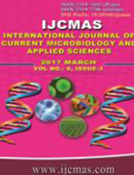


 National Academy of Agricultural Sciences (NAAS)
National Academy of Agricultural Sciences (NAAS)

|
PRINT ISSN : 2319-7692
Online ISSN : 2319-7706 Issues : 12 per year Publisher : Excellent Publishers Email : editorijcmas@gmail.com / submit@ijcmas.com Editor-in-chief: Dr.M.Prakash Index Copernicus ICV 2018: 95.39 NAAS RATING 2020: 5.38 |
Field trial was conducted at the Department of Farm Management, Tamil Nadu Agricultural University, Coimbatore during winter irrigated season of 2015-16 to evaluate the effect of organic manures and weed management practices on growth and soil microbial population of cotton. The tallest plants (127.0 cm) with heavier total dry matter (4525 kg/ha) which resulted in significantly recorded with composted poultry manure along with hand weeding at 20 and 40 DAS which was followed by application of composted poultry manure with power weeding. While, soil microbial population has increased application of composted poultry manure along with hand weeding at 20 and 40 DAS of bacteria (60.64 to 84.87, 77.78 to 106.4 and 46.4 to 77.25 ´106 CFU g/soil), fungi (32.72 to 52.60, 43.24 to 63.81 and 21.54 to 37.00´103 CFU g/soil) and actinomycetes (45.89 to 63.50, 59.58 to 78.64 and 41.79 to 59.57´104 CFU g/soil) at vegetative, flowering and harvest stages respectively, which was comparable with application goat manure + hand weeding twice. Based on the results, it can be concluded that composted poultry manure along with hand weeding or power weeding significantly energized the soil microbial load which has enhanced the growth and yield of cotton.
 |
 |
 |
 |
 |